
A farmer based organisation, Development Association (DAA) has held its 17th Annual General Meeting (AGM)-with new executives sworn into office to champion the cause of improving the standards of women smallholder farmers in the country.
The AGM which took place in Tsokomey, in Accra, witnessed the swearing in of a seven member executives led by Grace Quaye as president to steer the affairs of the association for the next five years.
The other members of the new executives include, Sarah Ayi (Vice President), Patricia Ashigbui (Treasurer), Lydia Asare (Vice Treasurer), and Ebenezer Kotah (Organizer).
The AGM on the theme, ‘Responding to the Changing Environment of the Rural Farmer’, took place at the DAA Fisheries Training Centre-a temporary centre built with support from the USAID Sustainable Fisheries Management Project. The main permanent centre would be completed by October this year, situated at Kokrobite, where courses in modern or improved agricultural practices would be run, to be facilitated by Council for Technical and Vocational Education and Training (COTVET).
The chairperson for the programme, Salomey Ansong called on women farmers in the country to form associations and those already members of one to remain committed to benefit from advantages of accessing credit and others.
She mentioned that climate change globally is affecting agriculture, therefore there is the need for an integrated form of agriculture to adapt to the situation to achieve food and nutrition security.
The programmes manager of the DAA, Abraham Asare, presenting the annual report said that the association and USAID Sustainable Fisheries Management Project worked together on issues of child labour education and awareness creation in fishing communities. In this regard, sensitisation programmes with students were held in Apam, in the Central region, among others.
In addition, women fish processors were also trained on hygienic fish handling techniques to improve fish processing-women were taken through hygienic practices including keeping surroundings clean, using clean water to wash off impurities under running water.
The year under review, 2016 also witnessed the Launch of Ahotor improved fish smoking stove at Winneba to reduce smoke and Polycyclic Aromatic hydrocarbons (PAHs) content in smoked fish.
Mr Asare also stated that a meeting with minister of fisheries and aquaculture development was held where discussions centred in rejecting bad fish that arrives at shore.
The association also undertook an advocacy programme, supported by the BUSAC Fund, which centred on Extension services delivery in the fisheries sector. The Fisheries commission recognised the problem and intends to begin extension service beginning with mobile service delivery.
Speaking on the theme of the meeting, Emelia Nortey, the director of the DAA Fisheries Training Center says among many threats and challenges is the fast growing of rural communities becoming urban areas.
“One can confidently say that, this trend will continue as one United Nation Report estimate that, the world population will reach 10 billion in year 2056 of which 65.2% will be urban population. The trends in Africa and for that matter Ghana will not be so different.
“As we reflect on the theme ‘Responding to the Changing Environment of the Rural Farmer’, we have to reflect on the various challenges faced by our farmer such as those in Tsokomey, Bortianor, Oshie, Kokrobite, etc. where the basic roles of women fish processors have not change much over the years but face constant threat of losing their processing areas to estate developers and also have to endure constant complains from inhabitants who have recently settled in these communities.
“To fully comprehend the circumstances of rural farmers and how their changing environment is affecting them positively or negatively, it is essential to examine the full multiplicity in the light of changing rural economy, household & community structures.
“These transformations do not occur in a vacuum but interact with other complex processes at different levels; therefore we need to adopt a different approach that is tailored to the changing needs of rural farmers. When the proper measures are taken, it can lead to positive change and food security,” she stated.




 Prince Harry, Meghan end Nigeria tour with Lagos visit
Prince Harry, Meghan end Nigeria tour with Lagos visit
 Presby Boys, Legon beat Prempeh College in Sharks Quiz
Presby Boys, Legon beat Prempeh College in Sharks Quiz
 CETAG members disapprove government’s approach to implementing NLC’s Compulsory ...
CETAG members disapprove government’s approach to implementing NLC’s Compulsory ...
 Voter registration: NPP's Richard Ahiagbah denies claims of double registration
Voter registration: NPP's Richard Ahiagbah denies claims of double registration
 Senegal buys back library of poet-president Léopold Senghor from France
Senegal buys back library of poet-president Léopold Senghor from France
 Ghana will lobby AU for intercontinental initiative on reparations – Akufo-Addo
Ghana will lobby AU for intercontinental initiative on reparations – Akufo-Addo
 Energy Commission warned gov't in 2023 about looming dumsor, issued advisory
Energy Commission warned gov't in 2023 about looming dumsor, issued advisory
 Dollarise Ghana’s economy to curb cedi depreciation — Dr Kwakye tells gov't
Dollarise Ghana’s economy to curb cedi depreciation — Dr Kwakye tells gov't
 NPP doesn't have flagbearer with Albion engine — Ken Kuranchie
NPP doesn't have flagbearer with Albion engine — Ken Kuranchie
 Afari Gyan is the most pragmatic EC Chair Ghana has had, Jean Mensa has failed a...
Afari Gyan is the most pragmatic EC Chair Ghana has had, Jean Mensa has failed a...
